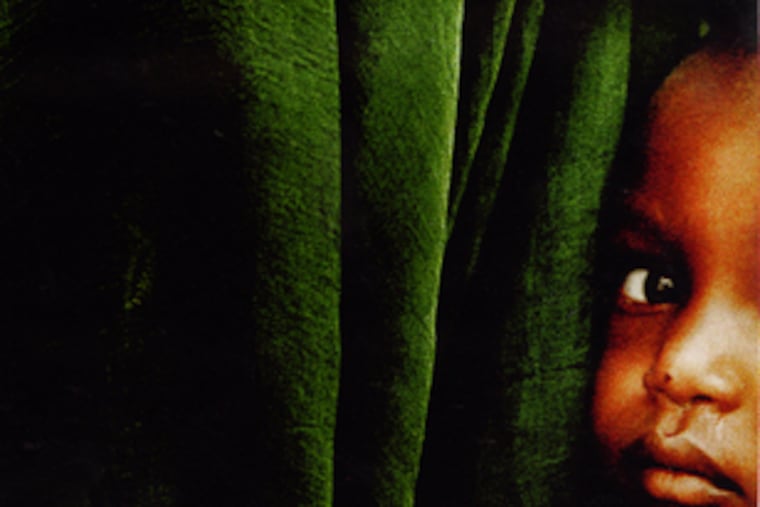Updates aim to put the Bible in vogue
You're meditating on your favorite verses in the Bible. Say, the opening chapter of the Book of Mark: "God said, 'I will send my messenger ahead of you to open the way for you.' "

You're meditating on your favorite verses in the Bible.
Say, the opening chapter of the Book of Mark: "God said, 'I will send my messenger ahead of you to open the way for you.' "
You turn the page, and suddenly, there it is: a great big color photo of Angelina Jolie.
Angelina Jolie?
Next to a passage about God's messenger?
Welcome to Bible Illuminated: The Book - New Testament, a gorgeous new edition of the latter half of the Christian Bible (the Old Testament is due out in late spring). The 300-page soft-cover volume is packaged to look like a glossy fashion magazine and has as many photos as any issue of Vogue or Elle.
The text features highlighted biblical passages counterposed with a wide array of stunning images, including schoolchildren in a Guatemalan village, a beautiful lone polar bear on the ice, a middle-aged man in Zambia being treated for AIDS, English suffragette Annie Kenney, an American soldier reaching out to shake the tiny hands of an Iraqi toddler, the slaughter of animals and humans in the Niger Delta, and the flooded streets of New Orleans after Hurricane Katrina.
Bible Illuminated, which uses the Good News translation and is designed to appeal to young, largely unchurched, liberal readers, is one of two new and radically different specialty Bibles. The other, The Green Bible, targets churchgoers who want to pursue a specifically Christian form of environmental activism.
Bible Illuminated is the brainchild of Swedish advertising executive Dag Soderberg, 55, a self-described secular humanist who says he has always been concerned about "[our] lack of knowledge" about the Bible, whose cultural importance he says is not limited to religion.
"We easily forget that it is a heritage of ours. Our government, our laws and our morals all come from it," he said on the phone from Stockholm, where he lives with his wife and four children. "No matter if you are a believer or not, you are stuck to it."
Biblical scholar Philip Towner of the Nida Institute of Biblical Scholarship in New York, who finds Bible Illuminated fascinating, insists that "it's important to understand that the images are not designed to provide interpretations of the text. What they do instead is to serve instead . . . as attention-getters."
Craig Detweiler, who teaches theology and pop culture at Fuller Seminary in Pasadena, Calif., says he's impressed by Soderberg's willingness to include potentially controversial images.
"I salute the chutzpah and imagination behind the project," he says. "I would consider [it] a great merging of timeless truths in a timely manner."
He even applauds the inclusion of Angelina Jolie, who appears in a series of folks that includes Bono, Nelson Mandela, Mother Teresa, Ghandi, the Rev. Dr. Martin Luther King Jr., the Dalai Lama and Princess Diana, all of whom are connected to the verse quoted above - implying they all are messengers of God.
Detweiler says that Jolie, well known both for her charity work and her glamorous lifestyle, challenges our usual conceptions of saintly behavior.
"The church has always looked to saints for role models and exemplars. So this Bible Illuminated raises questions about what sainthood looks like today," Detweiler says. "In the case of [Martin Luther King] and Mother Teresa, there may be less debate regarding their canonization." But with Bono and Jolie, the line "between idols to look up to and idolatrous celebrity worship blurs."
A different host of challenges is posed by the more scholarly Green Bible, which covers the Old Testament as well as the new. Using recycled and organic materials - the ink is made from soy-based pigments - it includes essays and work sheets about global warming and other environmental issues by noted religious leaders from evangelical and mainstream churches. Among them are Bishop Desmond Tutu; Pope John Paul II; evangelical leader Bishop N.T. Wright; activist Brian McLaren; James Jones, bishop of Liverpool; and Paul de Vries, president of Yale Divinity School.
"This is a very timely project," says Mark Tauber, senior vice president and publisher of HarperOne, which brought out The Green Bible. He notes that Christians of all political stripes have begun to take seriously the science behind the theory of climate change, generating a lively theological debate about environmentalism.
He says that more progressive theologians are developing a Christian environmentalism under the rubric of "creation care," which asserts that humans are charged with "stewardship of God's creation."
Ultra-conservative Christians, on the other hand, are more focused on eschatalogical issues, namely, questions about the apocalypse and the Second Coming. They feel, Tauber says, that "we just don't need to pay much attention to earthly concerns" and that focusing one's energies entirely on preserving life here on Earth smacks of idolatry.
Matthew Sleeth, a former emergency room doctor turned evangelical activist and lecturer, says The Green Bible has the potential to heal this divide.
"The Bible says that God makes the rain fall on the wicked and the just. It means we are all responsible for each other and the Earth," he says. "But somehow this got dropped from everyone's theology."
Sleeth, 52, author of the 2006 book Serve God, Save the Planet, which explores how his family "went green," said that "more and more conservative groups are exploring a Bible-based environmentalism," which he describes as a fundamentally conservative concern.
"In general the whole concept of the good steward and being a conservative - in the Oxford English Dictionary sense of the term - is to preserve something, especially with an eye toward the future." The environment, he adds, "is an issue we would ignore at our peril."